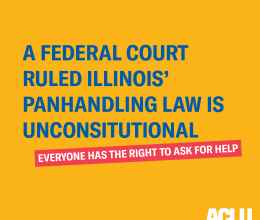
On Thursday, an Illinois Supreme Court ruling in People v. Melongo struck down the decades-old eavesdropping law, ruling it as unconstitutional. The law prohibited any citizen from making an audio recording of a conversation deemed as private without getting prior consent from all parties involved with a violation resulting in a felony charge. The ACLU of Illinois had criticized the law as a violation of the First Amendment. In 2010, the ACLU of Illinois challenged the eavesdropping law as it applied to the audio recording of police officers, in the lawsuit ACLU v. Alvarez. The Chicago Tribune writes:
Meanwhile, the American Civil Liberties Union of Illinois was challenging the law in federal court. The ACLU wanted to record cops on the job as part of its long-standing police accountability program, and it asked the court to prohibit Cook County State's Attorney Anita Alvarez from prosecuting its monitors under the eavesdropping law.
The ACLU said the law violated the First Amendment, a key purpose of which is to protect free discussion of the workings of government. A federal appellate court said that argument would likely prevail at trial, and the U.S. Supreme Court took a pass on Alvarez's appeal.



